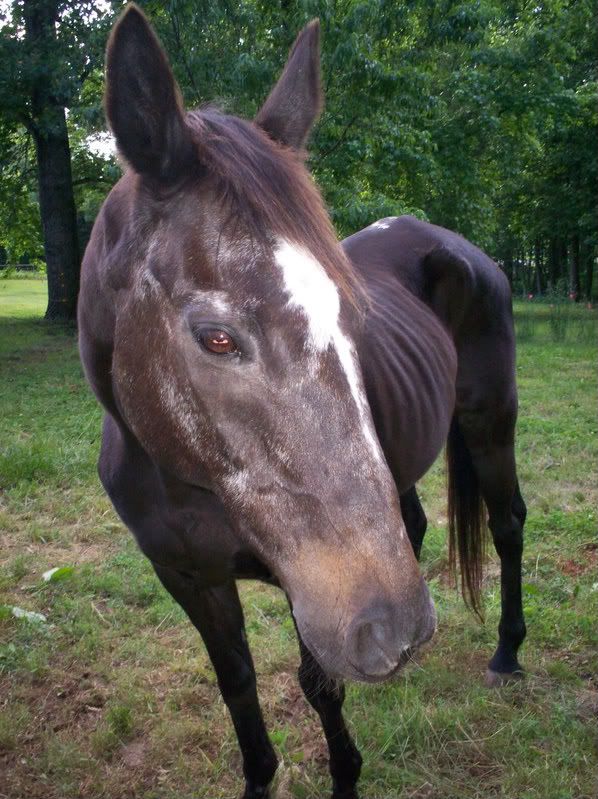 g. I've had horses for years, but not in the last few years due to money, space.. etc... Anyway, got Buddy free from a very nice lady a few hours away. I did commit to him sight-unseen because of how far away he was, and when he arrived I was shocked at his physical condition. I do not think the owner was intentionally cruel or neglectful, I believe them when they say how much the family as a whole adore this animal. I genuinely believe she was either unaware of just how bad his condition was, or that that was the very reason she was giving him away- to get him to someone who could care for him properly.
g. I've had horses for years, but not in the last few years due to money, space.. etc... Anyway, got Buddy free from a very nice lady a few hours away. I did commit to him sight-unseen because of how far away he was, and when he arrived I was shocked at his physical condition. I do not think the owner was intentionally cruel or neglectful, I believe them when they say how much the family as a whole adore this animal. I genuinely believe she was either unaware of just how bad his condition was, or that that was the very reason she was giving him away- to get him to someone who could care for him properly.Buddy arrived by trailer that Sunday morning. They could not bring the truck to my house because we're on a dead end street on a steep hill, so we unloaded right at the end of the road. Buddy stepped off the trailer, covered in sweat but otherwise in one piece... My jaw about hit the ground when I saw exactly how skinny the horse was. Every bone in his spine was visible, his withers and shoulder blades were clearly defined, with neither muscle or fat over them. All his ribs were prominent, hip bones sticking up and the muscle sunken in. His neck was lacking in any muscle tone (a sign of starvation) and looked like a flabby noodle. His legs, neck, and hindquarters are speckled with scarring, be it from bites, abuse, or rain rot I don't know. He was covered in bites from other horses, meaning he was the low man on the totem pole.
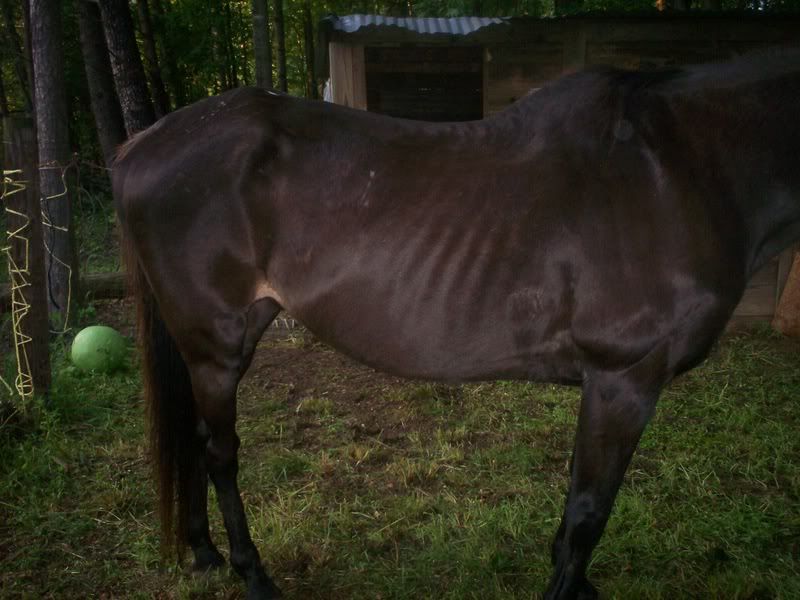 I walked him into my back yard, where Jaymes and my mother were waiting. The moment Buddy saw the long, lush grass, he was desperately devouring as much as possible. I brought him a bucket of beet pulp (a high fiber food that can be fed in great quantities and not cause colic or make a horse excessively 'hot') which he inhaled.
I walked him into my back yard, where Jaymes and my mother were waiting. The moment Buddy saw the long, lush grass, he was desperately devouring as much as possible. I brought him a bucket of beet pulp (a high fiber food that can be fed in great quantities and not cause colic or make a horse excessively 'hot') which he inhaled.The vet who saw him scored him at a body condition of 2-3, and said that he would not have lived more than another 6-12 months the way he had been going. Despite the condition, he does not appear to have any internal damage. His hooves were thrushy and abcessed, which the first farrier who came out to see him did not notice for some reason (not using him again!) and I saw when an abcess blew out at his coronary band.
After 2 months of treatment, the thrush is minor, and easily controlled. The abcesses have healed almost completely. He has a bowed tendon, which I'm thinking was an old injury that he aggravated by putting the majority of his weight on the leg while the opposite leg was sore from his abcesses. We're treating that with a support wrap.
Buddy has gained a LOT of weight. I've got him on the following feed schedule, three times daily:
1 scoop soaked beet pulp
1 scoop senior feed
1 scoop Weight Builder
1 scoop Joint Care supplement
He was very wormy when I got him, so I immediatley wormed him. He took it well, tossed his head a little but that's common.
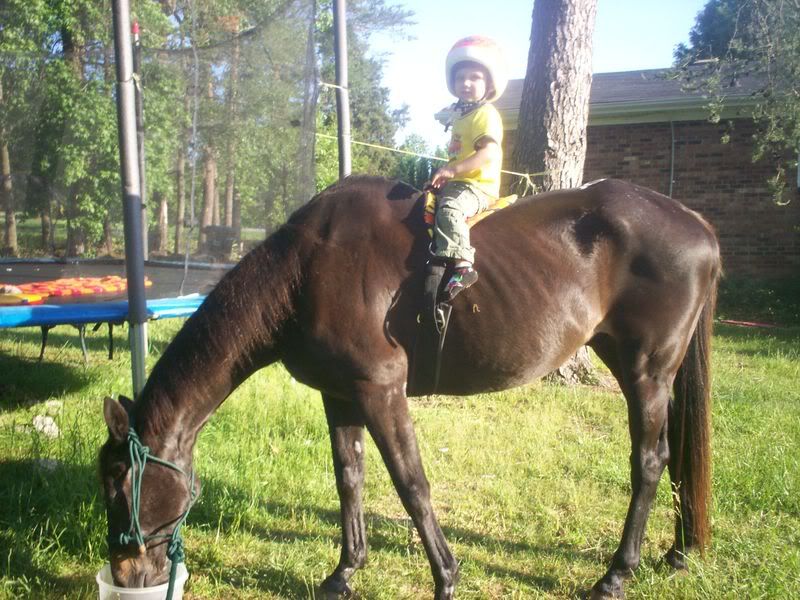 Buddy is a saint. Jaymes can hug him, kiss him, meltdown right next to him, run past him... And Buddy doesn't flick an ear. When Jaymes is on his back, Buddy goes slow and steady, as if he knows the child on his back is special and needs him to be careful. Jaymes gets on this enormous ex-racehorse without fear. He rides bareback, with only a saddle pad to keep him up. His balance when on horseback is superb. He holds his head high and smiles to the world. He's the big man on that horse. We walk down the road (now that the legs and feet feel better!) and Jaymes calls out to everyone he sees: "Hiiiiiiiiiiiiiiiiiii!"
Buddy is a saint. Jaymes can hug him, kiss him, meltdown right next to him, run past him... And Buddy doesn't flick an ear. When Jaymes is on his back, Buddy goes slow and steady, as if he knows the child on his back is special and needs him to be careful. Jaymes gets on this enormous ex-racehorse without fear. He rides bareback, with only a saddle pad to keep him up. His balance when on horseback is superb. He holds his head high and smiles to the world. He's the big man on that horse. We walk down the road (now that the legs and feet feel better!) and Jaymes calls out to everyone he sees: "Hiiiiiiiiiiiiiiiiiii!"Jaymes carries the hose out to the pasture and fills Buddy's water tank. He brushes Buddy's legs. He carries the feed bucket, and pours the grain into it. He leads Buddy (with me secretely holding the lead rope) to and from his stall, and he carries Buddy's hay. Once we've finished our horse chores each evening, Jaymes has a cheerful "Byebye Bud-dy! Byebye night night!" for his horse. He doesn't say night night to me!
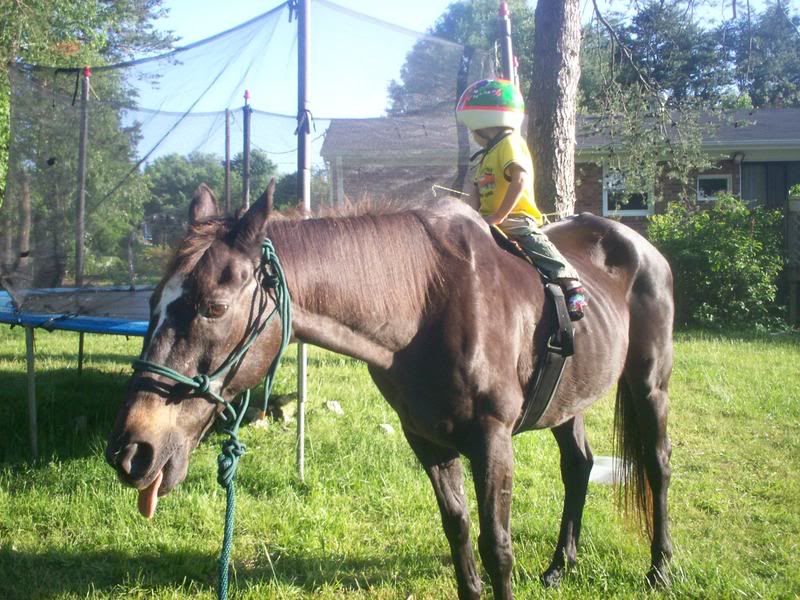 Please, if you are considering getting a horse, be sure you know about your breed, and about nutrition. Old horses don't have to be skinny. All Thoroughbreds are not emaciated- and just because he is a TB does not mean that his body condition was acceptable. TB's are hard keepers, typically. That means you need to feed them, supplement them, give them extra- not make excuses for why they are bags of bones.
Please, if you are considering getting a horse, be sure you know about your breed, and about nutrition. Old horses don't have to be skinny. All Thoroughbreds are not emaciated- and just because he is a TB does not mean that his body condition was acceptable. TB's are hard keepers, typically. That means you need to feed them, supplement them, give them extra- not make excuses for why they are bags of bones.Jaymes and Buddy were meant for each other. Jaymes has grown, become confident, has a real purpose in mind when we're with Buddy. That makes it worth the effort to rehabilitate this animal.
Buddy is still very thin. He is unrideable for anyone larger than Jaymes. He has a forever home with us, with no expectations of him. This horse has given his all for 23 years, he doesn't need to earn his keep here. This is the kind of horse, who if sold, will end up on a truck to Canada or Mexico for slaughter. Our old horses have given their lives, their love, and their hearts to us. Don't they deserve a loving, dignified retirement?
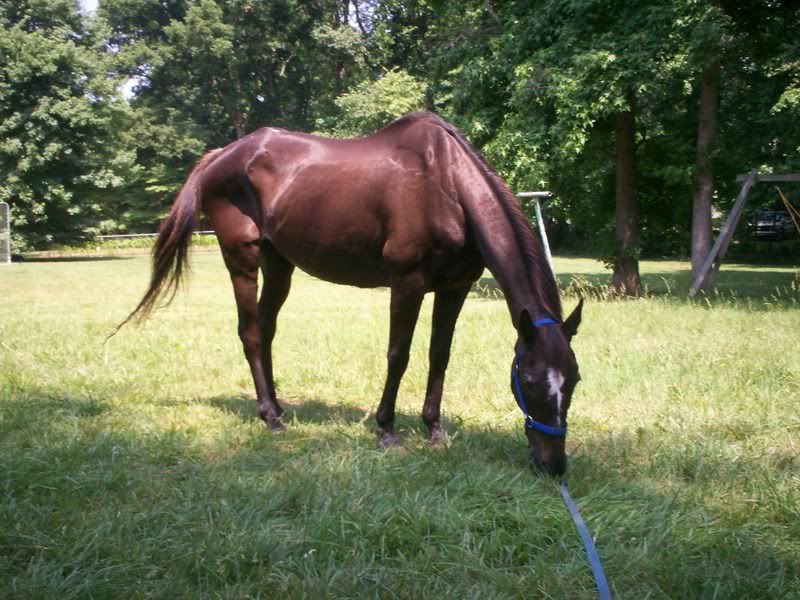
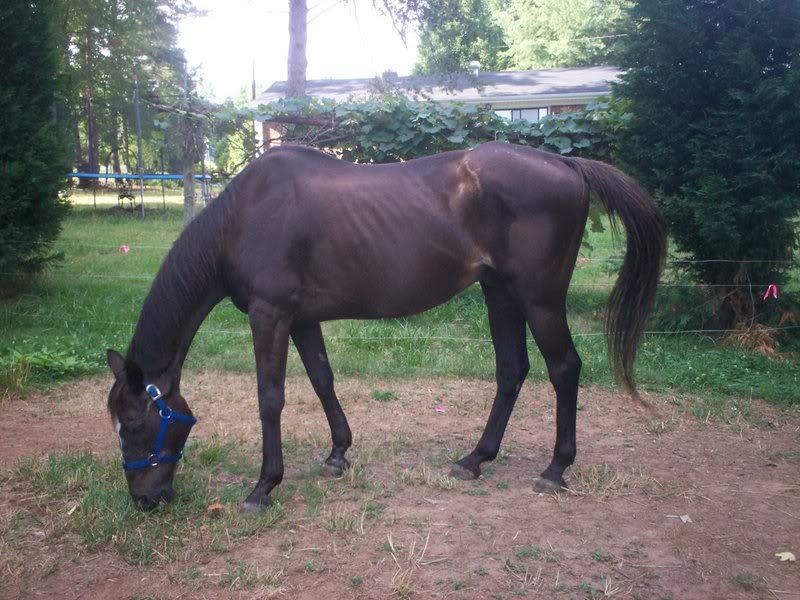
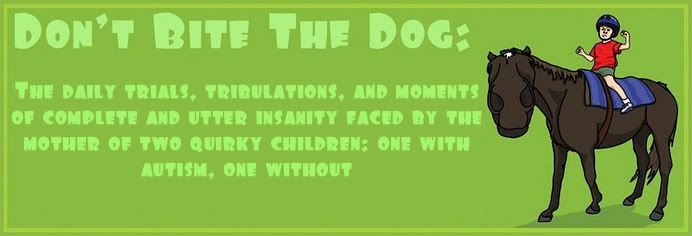







3 comments:
Buddy looks SO much better! He really did look scary at first. How are his teeth?
It's really cool how Jaymes has bonded with him. It looks like it benefit both of them. Horses (and animals in general) seem to know when something is not quite right and they should be careful.
Vet looked at the teeth and said they didn't need floating. No sharp edges, or anything wrong... I'll probably hasve it done later this year anyway though.
Hi there! I'm Squid's pal Liz, and I came over on her recommendation.
GREAT job on the refeeding -- it is so easy to make a very thin horse sick with overfeeding. His coat looks great, and the weight gain looks about appropriate for the elapsed time.
You might consider adding corn oil to his diet, instead of the senior feed, which is a high-fat-content diet.
I've re-fed 2 skinnies, and regularly used it for the "old folks" -- my daughter's pony who lived to approximately 48 (if his history was to be believed) and the Gray Mare after she lost most of her molars. At the time, I used corn oil because it was cheap; I believe the price has gone up because of biofuels, etc. In England, I believe they feed canola oil, which is widely grown and relatively inexpensive.
Some horses will accept oil as a top dressing on the beetroot; others like it as a top dressing on a chopped feed like AllNOne (if that's available in your area--chopped alfalfa and oat hay, moistened with molasses).
Start slow (2 tablespoons) and build up incrementally to up to 2 cups a day. If the manure is oily or too loose, cut back until the manure is normal, and slow down the step-up.
Does Buddy have a lip tatoo? If he does, you can find out his racing history from the Jockey Club, which might give you some clues to his past.
And in my opinion, slightly chubby TBs tend to be quieter than skinny ones.
Post a Comment